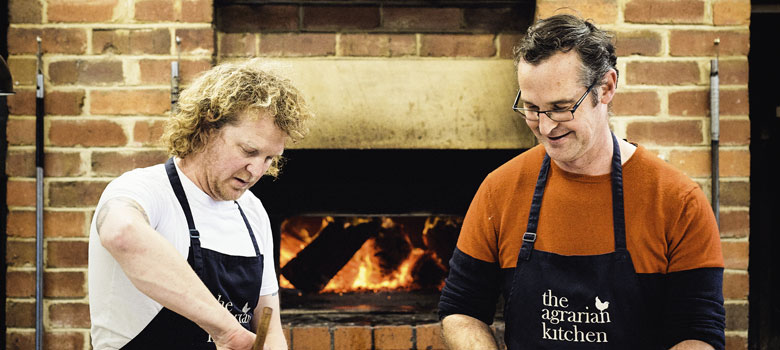
Food
The Agrarian Kitchen
When The Agrarian Kitchen founders Rodney Dunn and Séverine Demanet entertain, simplicity is the key ingredient at the heart of their celebrations.
You’re not going to someone’s house for the dining experience,” says Rodney Dunn, a smile in his voice, “you go to restaurants for that.” And there it is, perhaps the greatest single piece of entertaining advice there is!
Rodney Dunn and Séverine Demanet should know. After 14 years running The Agrarian Kitchen Cooking School out of their own home, teaching the delights of large communal platters and produce plucked directly from their garden, the duo is well-versed in the pleasures (and pitfalls) of an excellent shared table.
If their home, a former schoolhouse, was fitting for the cookery school, a former mental asylum may have also been telling for their restaurant. Nonetheless, a few years ago when the opportunity to take over the lease of New Norfolk’s historic Bronte building, about 40 kilometres north west of Hobart, ready for a new challenge, they jumped and The Agrarian Kitchen Eatery was born.
“There was so much beautiful, abundant produce,” says Dunn, “and we could share it with more people. It makes us really happy to eat great food, it was such a revelation to eat such great produce – I thought other people would be excited by that too.”
Just like the cookery school, the restaurant has been a huge success, winning awards and accolades from the day it opened. Incredibly, that success has continued over the past 18 months when Tasmania has been locked off to the rest of the country.
So, what is the secret to this effortless entertaining, feeding and hospitality? Simplicity, it appears is the answer. “We have tried to work with the Japanese lean principle,” Dunn explains. “There are a couple of businesses doing it, perhaps the biggest example is Toyota in Japan. At first, I thought it was artistic free-spirited nonsense, but the more I looked, the simpler and more genius it appeared.”
The lean principle, known as kaizen or the culture of continuous improvement, was born post World War Two and works on the premise that improvement is always possible, particularly if it’s continually affected from the people working the processes. “We now apply it to everything,” continues Dunn. “Cut out the crap, the stuff you do ten times a day, and instead move to a better spot and do it once – move the storage space for your tools, cover all the garden beds with the same size cover. It’s the little things.”
“If you think of the things you hate in your role,” explains Demanet, “and why you hate it and then how we can fix it. For example, in the restaurants we had the napkins all in one cupboard – 30 steps to get to the cupboard and 30 back – so we put napkins at both ends of the room. It then makes it easier to focus on other things, the things you like.”
A simple celebration
It’s fascinating to see how far this principle of simplicity permeates their life. The more we talk, the more I realise it is at the absolute core of all the decisions … and all their entertaining.
“Our last big celebration had farmers, producers, brewers, we had the wood-fired oven slow roast lamb, veggies from the garden, Ashley [Huntington of Two Meter Tall Brewery] brought a keg of beer, Pat [Nourse, features editor at Gourmet Traveller when Dunn was food editor] came down and camped in the yard.
“The company is incredibly important. You can have all the best food in the world, but without good company, it’s not much of a party. That’s the essence of it, the unplanned stuff that makes it really special.”
“There were multiple trestle tables under trees, clothed in hemp,” adds Severine, “flowers on the table, groups of people would sit under the tree, it was casual, and yet there were proper plates and glassware.”
Brioche doughnuts with ricotta and blackcurrants; Fried angasi oyster rolls
“Pat muddling raspberries from the vine to make cocktails. Luke [Burgess, renowned chef and photographer] and I jumping in the kitchen and cooking together. We have the perfect elements in our house – huge kitchen and garden.”
And here’s where the organisation sneaks in: “When organising the menu in advance, I again focus on that lean principle. Big plates of food, platters down the middle, it’s never plated food for each person; instead the vegetables, meat, desserts are already made. Get that initial run of food down. Have some drinks done.”
“The table is also prepared the night before,” continues Demanet. “It’s set up inside if it’s raining, glasses are done. I hate not being ready the night before. The fact I can have amazing flowers from the garden and forage them along our front road boundary means we can have big beautiful arrangements that haven’t been flown in and sprayed…and is in keeping with Rodney’s food that is also sourced from our garden.” And so, to the simplicity of our first thought. Lean, simple, efficient…and organised.
Rodney’s Christmas trifle
“Our Christmas always features a trifle, in the glasses already done, the perfect do-ahead dessert. I LOVE it, we have to do it. Traditionalists be warned, I don’t put jelly. I always make the sponge – a swiss jam roll. And then it has to be sherry; I like to use berries, the beautiful thing about our southern hemisphere Christmas is its coordination with raspberries. And its crowning glory is a fruit based granita. And so, sponge (plus booze,), custard, fruit, cream and fruit granita on the top – it’s a splice thing. It’s the best.”